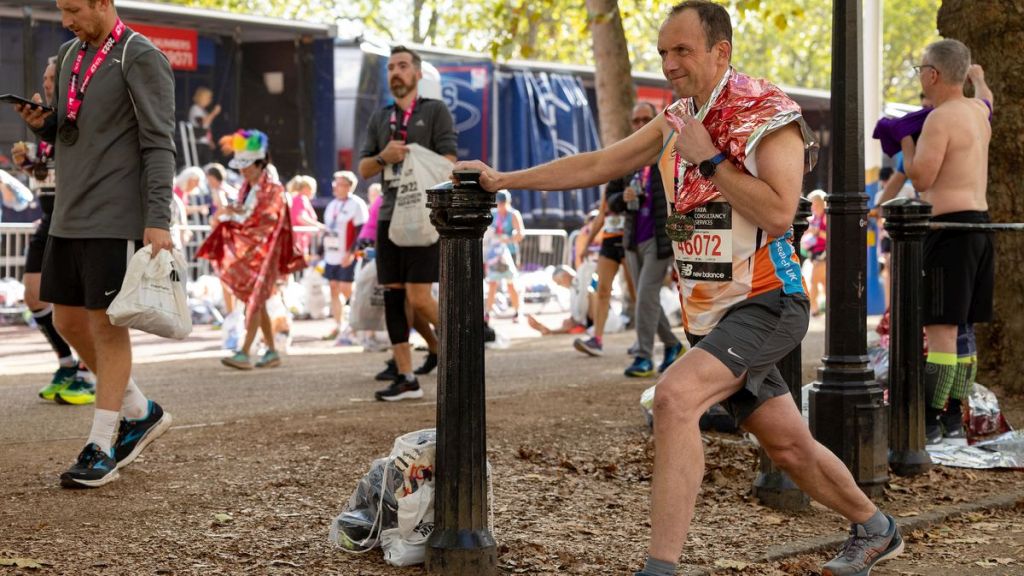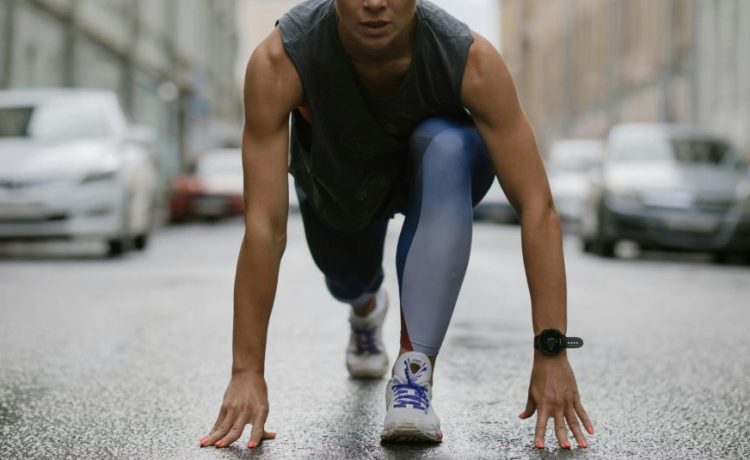There are, of course, different ways of looking at it – you can look at the recovery through the eyes of a medical professional (for a more objective, scientific approach), a seasoned runner (and follow their subjective feeling) or opt for something in between.
The third option, “the in between”, is the one we’ve decided to present with you today since we don’t have a medical doctor on our team, but we do have some physical therapists and amateur runners. So, this advice should help most readers, and if you’re looking for a “more professional” overview, it might be best to speak to your doctor before even deciding on running a marathon.
Crossing The Finish Line
There are certain things you need and should do immediately after finishing your marathon, crossing the line! The first one is not to stop to do some stretching. Sure, your muscles will ache and you’ll feel like dying and you’ll just want to collapse on the floor, but that’s not such a good idea. Your muscles are sore and achy, so stopping to do some static stretches might even make matters worse and damage them even further.
What you should do is try to keep moving for up to 20 more minutes. Of course, you’ll lower the intensity, but it’s important to keep moving and cool off your muscles (and your entire body) gradually.
Once you are done taking a shower and changing your damp, sweaty running kit, you should focus on eating. Make sure your first post-marathon meal is a substantial one, while also making sure it’s a well-balanced one, since you need to replenish your energy with a nice mix of carbs and protein-rich foods.
Also, keep yourself well hydrated at least in the next 24 hours following the marathon.
Getting a Well-Deserved Massage
You might be tempted to run off to your local physical therapist and get a nice, long, obviously, well-deserved full-body massage. But, should you?
We spoke to a number of different doctors and most of them agreed you should wait for a few days. Why? Keep in mind that your body endured a huge amount of stress (stress most people never even experience in their life), and getting a massage might aggravate this stress even further.
So, what’s going on within our body after a marathon:
- Though running is a healthy activity, such a huge amount of stress causes microtears within your muscles, which leads to inflammation. If you decide to get a massage, you might aggravate this inflammation and prolong your body’s healing process.
- Simply put, damaged muscles are easy to damage even further. And something as therapeutic as a massage, can hurt your aching muscles.
- After finishing a marathon, a runner is dehydrated and has a lowered blood pressure. Getting a massage while you’re in such a state can lower your blood pressure even further and put you at risk of fainting and dizziness.
As you can see, perhaps these are not some major problems you should be worried about, but it won’t hurt to wait for 24 to 48 hours before getting your first massage.
Instead, you can give ice bath a try or compression therapy.

Evening Routine and Going To Bed
Even though you might be tempted to go to a pub and celebrate your huge achievement (which it certainly is), please refrain from it, as your body needs rest.
If you have the time, the most ideal thing would be to get a nice 90-minute afternoon nap. And before going to bed and calling it a night, make sure you stay away from alcohol and anti-inflammatory painkillers. Both these might damage your liver (while your body is still weak and healing) or dehydrate your body further, so it’s best to wait for at least a few days before indulging yourself. And if you’re really in pain, you can pop a paracetamol.
And speaking of supplementation, you should make sure you replenish iron, vitamin D, calcium and Magnesium… to name a few. So, any supplements containing these should be good. And if you want to speed up your recovery process even further, you might want to look into peptides. One in particular, tesamorelin ipamorelin blend, is a mix especially developed to improve recovery, boost metabolism and help your muscles heal faster.
The Day After
Know that even if you’ve done everything right (you are well, slept well and added some supplementation to the mix), you’ll still feel like a bus ran over you, and that’s normal. You’ll likely want to do nothing and go nowhere; there’s nothing wrong with listening to your body and allowing it to heal without any further physical stress. You should also stay away from people with colds and infections, as your body is still in recovery mode and more susceptible to these.
As the time goes by, you’ll want to engage in at least some sort of physical activity, especially if you are that kind of person, so 2-3 days after your run, you can try some light cycling or swimming. Swimming is, of course, a better option, but it might not be as accessible, so some light cycling might do the trick and give you that sense of active recovery.
A Week Is Going By
4-5 days (even a full week)is enough time for your body to not fully go back to normal, but at least get back into a running shape. And you can try going for a run.
Of course, you won’t be running any marathons so soon into your recovery, but you can try running for like 10-20 minutes, at a light pace and see how your body responds. There are instances where your body will not respond well and demand more rest. Listen to it, stop running and go back home. There is no need to push it and prove anything to anyone, just let your body heal fully before putting it under additional stress.
This is also the time for engaging in some light weight training, all with one goal of speeding up your recovery, instead of sitting at home on your couch.
Going Back To Running Full Force
After several weeks, you might get tired of resting and want to get “back in the game,” but you need to be careful as to when and to which extent you should be going back to said game. Researchers suggest that restoring your muscle glycogen (source of fuel) might take between one to 4 (or even 5) weeks, which is why it’s advised to wait at least for one full month, before thinking of doing another marathon.
Within the running community, there are two schools of thought – one that says you need to rest for one day for each mile ran (26 in total), while some even suggest adding one day for rest for every kilometer (42 days) ran.
Whatever the case may be with you, our advice is to start out slow, do a few trial runs of around 30min to a full hour, see how your body responds and, if everything checks out, go for another epic run!





